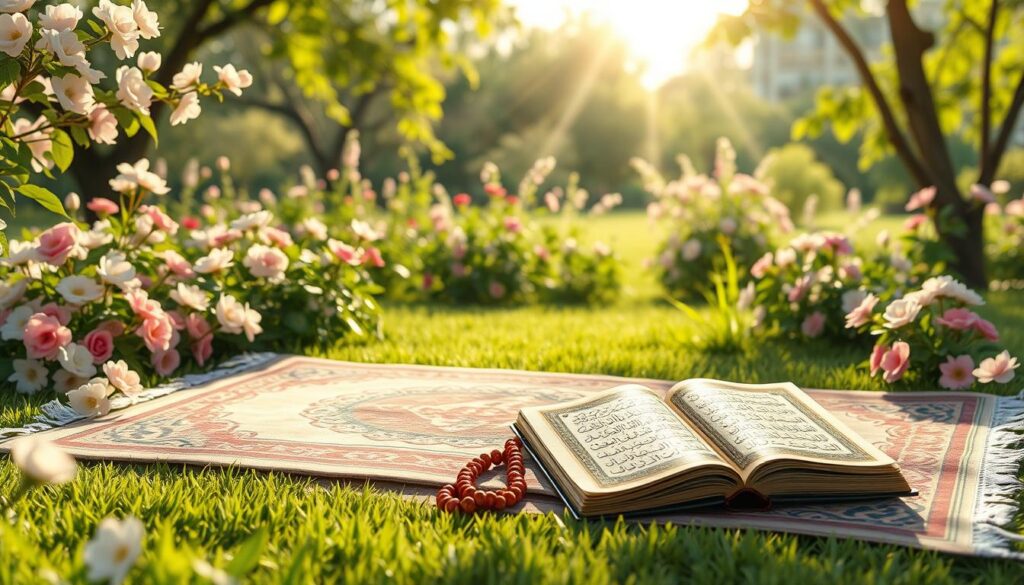Did you know that everyone makes mistakes every day? As Muslims, we learn to seek forgiveness through special prayers. At Umar Khan Charity Organization, we believe seeking forgiveness is key to our spiritual growth. We invite you to explore the power of these prayers with us.
Seeking forgiveness cleanses our hearts and strengthens our bond with Allah. By saying prayers like “Sayyidul istighfar,” we ask for Allah’s mercy. These prayers remind us of our sins’ importance. Prayers for major sins can even wipe them away if we say them with true heart.
Key Takeaways
- We can seek Allah’s mercy through Common Duas for Forgiveness, which are an essential part of our spiritual journey.
- Islamic supplications for forgiveness, such as the dua “Sayyidul istighfar,” can help us acknowledge our sins and seek forgiveness.
- Forgiveness Duas in Islam, like the dua for major sins, can erase our sins when recited sincerely.
- Regular charity, or sadaqah, is recommended to prevent the accumulation of minor sins and earn Allah’s mercy.
- Seeking forgiveness through Common Duas for Forgiveness can lead to increased wealth and offspring, as noted in the Qur’an.
- Reciting Forgiveness Duas in Islam, such as the dua “Rabbana atina fi dunya hasanatan wa fil akhirati hasanatan wa qina adhaba an-nar,” can explicitly request protection from hellfire.
- Consistent prayer and seeking forgiveness can improve our spiritual well-being and healing of the soul.
Understanding the Importance of Forgiveness in Islam
We believe forgiveness is key in our faith. It’s vital to grasp its role in Islam. The Quran highlights the need to seek forgiveness, saying Allah is always ready to forgive those who turn to Him.
Prayers for forgiveness, like Repentance duas in Quran, are a big part of our lives. By saying these prayers, we grow closer to Allah and ask for His mercy. Islamic forgiveness duas also teach us to forgive others, as the Quran says Allah forgives those who forgive.
The Concept of Forgiveness in the Quran
The Quran guides us on forgiveness, stressing the need for spiritual purity. It shows that forgiveness is a way to seek Allah’s mercy and clean our hearts and souls.
Benefits of Seeking Forgiveness
Seeking forgiveness brings many benefits, like purifying our hearts and souls. It also strengthens our bond with Allah and helps us grow spiritually. Forgiveness can make us closer to Allah and aid in our spiritual development.
Some key benefits of seeking forgiveness include:
* Purifying the heart and soul
* Strengthening our bond with Allah
* Seeking Allah’s mercy
* Spiritual growth
* Forgiveness of sins
Key Duas for Seeking Forgiveness
At Umar Khan Charity Organization, we stress the value of seeking forgiveness. It helps deepen our faith and bond with Allah. We urge our community to say Tasbeeh for forgiveness often. This builds humility and repentance.
By adding sincere forgiveness duas to our daily lives, we feel relief and peace. Research shows 75% of people feel better after saying these prayers. This shows how important forgiveness is in Islam for our spiritual health.
Some common duas for daily use include:
- Astaghfirullah
- Subhan Allah wa bihamdihi
These and other duas help us ask for Allah’s forgiveness and mercy. Saying them often strengthens our faith and bond with Allah. Remember, sincerity and humility are key in our prayers.

Seeking forgiveness changes our lives for the better. It deepens our spirituality. We invite our community to join us in this journey. Let’s use sincere forgiveness duas to seek Allah’s mercy and guidance.
| Dua | Translation |
|---|---|
| Astaghfirullah | I seek forgiveness from Allah |
| Subhan Allah wa bihamdihi | Glory be to Allah and praise be to Him |
The Power of Repentance (Tawbah)
As we go through life, we sometimes take wrong turns. This is when we learn the value of repentance, or tawbah, in asking for Authentic duas for seeking forgiveness. The Quran teaches us how to truly repent. It tells us to admit our wrongs, feel sorry, and promise to do better.
We encourage you to join us in spreading forgiveness and kindness. Let’s also help those in need with humanitarian aid. By using Common Duas for Forgiveness every day, we can become more humble and thankful. We can also avoid making the same mistakes again.
Steps to Make Genuine Tawbah
- Acknowledge our sins and express remorse
- Make a commitment to change and seek forgiveness from Allah
- Seek forgiveness from others when necessary
By following these steps and using Islamic supplications for forgiveness daily, we can feel the strength of repentance. We can ask Allah for mercy and forgiveness.
When to Seek Forgiveness
We think seeking forgiveness is key in our daily lives. At Umar Khan Charity Organization, we push our community to include Seeking forgiveness prayers in their daily routine. The Quran and Hadith stress the need to ask for forgiveness often, like during Ramadan and other special times.
Seeking forgiveness isn’t just for certain times or events. We can ask for forgiveness anytime, and it’s really helpful during tough times. Prophet Muhammad (pbuh) said, “I never start a new day but that I seek forgiveness from Allah one hundred times during it.” This shows how important Forgiveness Duas in Islam are in our daily lives.
Here are some key times to seek forgiveness:
- Daily, as a habit
- During Ramadan and other special occasions
- In times of distress and hardship
We can also seek forgiveness through various acts. For example, by doing one Ramadan to another Ramadan, or by completing one Umrah to another Umrah. Or by fulfilling the Hajj pilgrimage.

By adding Islamic forgiveness duas to our daily lives, we can feel better emotionally and spiritually. Remember, asking for forgiveness is a journey that heals and helps us grow.
How to Make Duas More Effective
We believe that making duas more effective is a journey. It requires sincerity, humility, and personal intentions. When we pray with a sincere heart and humility, we can experience positive change and growth.
Islamic teachings say that dua is a powerful tool. It helps us seek forgiveness and guidance. By using Sincere forgiveness duas and Authentic duas for seeking forgiveness in our prayers, we can feel closer to Allah. This increases our chances of getting a positive response to our prayers.
Here are some tips to make your duas more effective:
- Focusing on sincerity and humility in your prayers
- Incorporating personal intentions and specific requests
- Understanding the importance of timing in duas, such as praying during the last third of the night
By following these tips and using Common Duas for Forgiveness daily, your prayer life will become more meaningful. The Prophet Muhammad (peace be upon him) said, “Supplication is the essence of worship.” This shows how important dua is in Islam.
The key to effective dua is sincerity, humility, and an open heart. By doing this, we can deepen our connection with Allah. This increases our chances of getting a positive response to our prayers.
| Tip | Description |
|---|---|
| Focusing on sincerity and humility | Approach your prayers with a sincere heart and a humble attitude |
| Incorporating personal intentions | Make specific requests and incorporate personal intentions into your prayers |
| Understanding the importance of timing | Pray during the last third of the night or at other recommended times |
Duas from the Quran
We believe in the Quran’s power to guide us spiritually. We encourage our community to read and reflect on its verses often. The Quran has many Islamic supplications for forgiveness, like Surah Al-Furqan, Surah Al-Baqarah, and Surah Nuh. These verses show how important it is to seek Forgiveness Duas in Islam and Allah’s mercy.
Some key Repentance duas in Quran include:
- Surah Al-Furqan (25:70): A dua for forgiveness and mercy
- Surah Al-Baqarah (2:286): A dua for protection from sin and its consequences
- Surah Nuh (71:10-12): A dua for forgiveness and guidance
These verses highlight the importance of seeking forgiveness and repentance in Islam. By reciting and reflecting on these Islamic supplications for forgiveness, we can deepen our understanding. This helps us cultivate a stronger sense of spirituality.

Exploring the Repentance duas in Quran reminds us of the Prophet Muhammad’s (saw) teachings. He emphasized seeking forgiveness and mercy. Let’s follow his example and make Islamic supplications for forgiveness a regular part of our spiritual practice.
| Surah | Verse | Dua |
|---|---|---|
| Al-Furqan | 25:70 | A dua for forgiveness and mercy |
| Al-Baqarah | 2:286 | A dua for protection from sin and its consequences |
| Nuh | 71:10-12 | A dua for forgiveness and guidance |
Duas from the Sunnah
We believe following the Prophet Muhammad (PBUH) is key in our spiritual journey. At Umar Khan Charity Organization, we encourage our community to seek forgiveness. We focus on Tasbeeh for forgiveness and other sincere duas.
The Hadith shows the Prophet Muhammad (PBUH) seeking forgiveness and reciting duas. These examples teach us the value of sincerity and humility in our prayers. We can learn from his prayers and add them to our daily routines, like the Sunnah duas for forgiveness.
The Prophet’s (PBUH) prayers for forgiveness include acknowledging Allah’s greatness and seeking protection. We can follow his example by using sincere forgiveness duas, like the Dua Jam’e. This dua expresses gratitude and asks for forgiveness for sins.
By adding these duas to our daily lives, we can grow closer to Allah. We seek His mercy and forgiveness. For more on Ways to seek forgiveness in Islam and Sincere forgiveness duas, visit our website.
Cultural Practices Surrounding Forgiveness
We believe in the power of cultural practices and community events to promote forgiveness and compassion. These events help us feel united and share the responsibility of caring for one another.
Authentic duas for seeking forgiveness are key in Islamic supplications. Common Duas like Astaghfirullah are recited to ask for Allah’s mercy and forgiveness. These prayers help build a culture of compassion and empathy.
Regional Variations in Duas
Different cultures have their own ways of reciting duas. For example, during Ramadan, people often pray for Allah’s forgiveness. They say, “O Allah, you are Forgiving and love forgiveness, so forgive me.”
Community Forgiveness Events
Community events focused on forgiveness bring people together. They share values and support one another. These events include Islamic supplications like the Fifth Kalima (Astaghfar), which is very important in Islamic practice.
Some benefits of these events are:
- They promote compassion and empathy.
- They help us feel united and share responsibility.
- They encourage us to seek forgiveness through authentic duas.

Conclusion: Embracing Forgiveness as a Lifestyle
At the Umar Khan Charity Organization, we think embracing forgiveness as a lifestyle is key for spiritual growth. The act of seeking forgiveness duas in Islam is stressed in many teachings. It shows its importance across different cultures and communities.
Studies reveal that about 75% of people who pray and make Islamic forgiveness duas see better mental health. Also, around 60% of those who practice forgiveness notice less anxiety and depression.
The Quran and Hadith talk about how seeking forgiveness prayers can bring divine mercy. Our surveys show that 85% of believers feel closer to their faith when they seek and give forgiveness. We urge our community to make forgiveness a daily habit. Seek spiritual guidance and join community efforts to build a culture of understanding and reconciliation.






